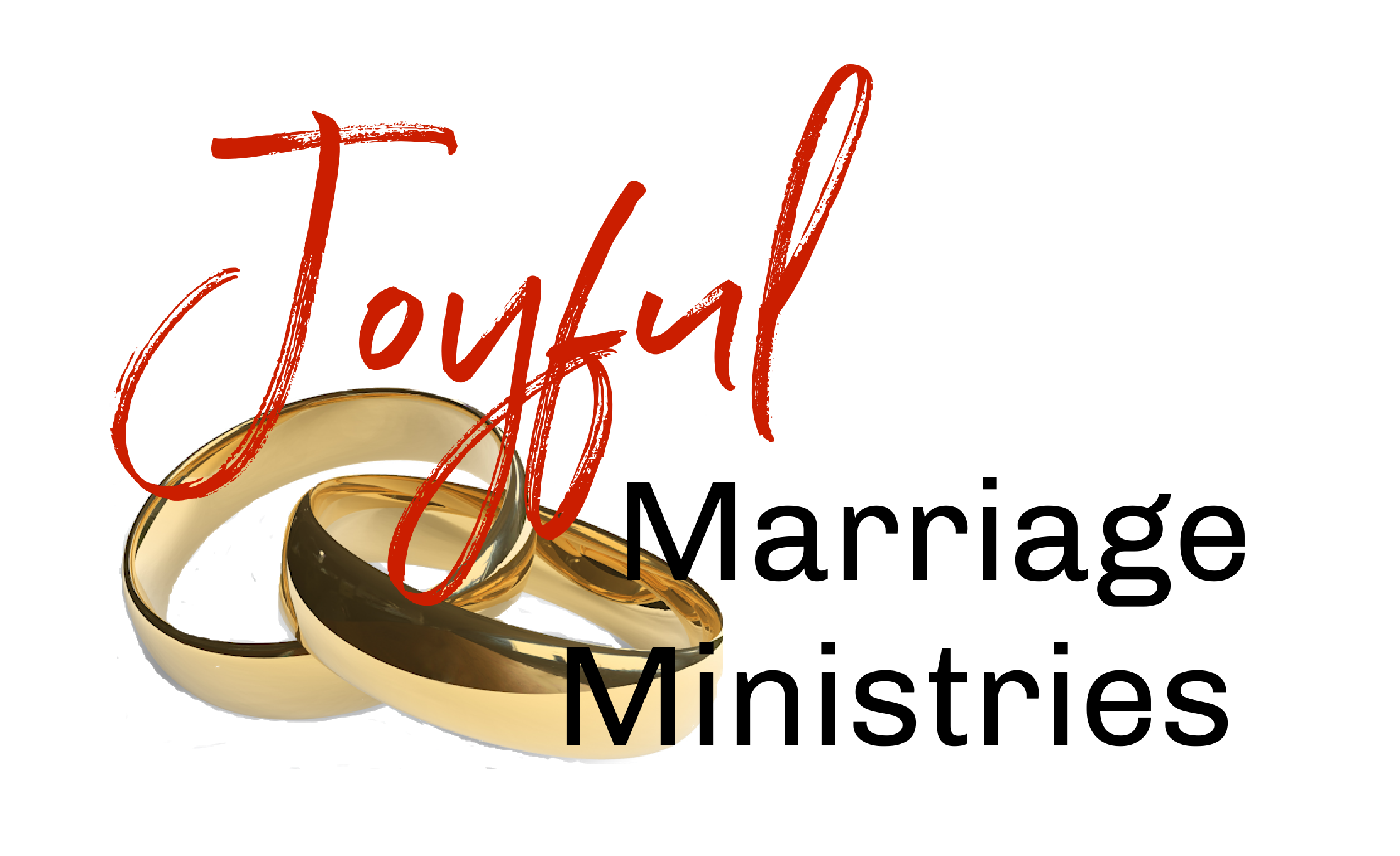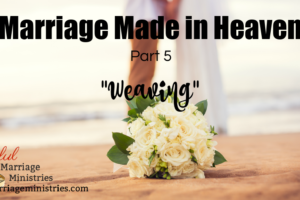We’ve all heard the phrase “a marriage made in heaven,” but it may bring to mind different thoughts and images. In this series, we will talk about what makes a strong healthy marriage. In the coming posts, we will look at communication, the husband’s and wife’s roles, parenting, respect, and submission (what it really means), among other things. Today we will talk about what the Bible calls cleaving or being joined together.
Marriage Made in Heaven? “Cleaving”
In week one I talked a little about God’s plan for marriage and how when Adam and Eve sinned and disobeyed God, it not only damaged their relationships with God but with each other.
In week two I shared my own testimony of marriage, divorce, remarriage, and God’s grace. If you missed it, I hope you’ll check it out.
Last week I started talking about one of God’s clearest and most definitive statements on marriage. It appears four times (Gen. 2.24; Matt. 19.5; Mk. 10.7-8; Eph. 5.31) in His inspired Word (once in the Old Testament, three times in the New, once before the fall, and three times after). It was and is God’s plan and purpose for marriage in a nutshell.
Therefore a man shall leave his father and mother and be joined to his wife, and they shall become one flesh (Gen. 2.24).
Often, when a couple is struggling in their marriage, it can be traced back to a failure to follow this blueprint in one or more of these areas. So what are the components of God’s divine plan for marriage listed in this verse?
As I said in the last lesson, the keywords are “leave,” “joined,” and “one flesh.” The word “joined” was translated as “cleave” in the old King James Version and we’re calling the idea of becoming one flesh, “weaving.” So we are to leave, cleave, and weave our lives together.
Last time I focused on leaving. Briefly, it means we no longer depend on our parents emotionally, financially, or relationally. It means what they want or expect does not take priority over our spouse’s wishes and it means not running to them with every problem.
Today we’ll spend more time on what it means “to cleave.”

Cleaving
God intends marriage to be a permanent relationship between one man and one woman for life.
In Matthew 19 Jesus said:
4 … “Have you not read that He who made them at the beginning ‘made them male and female,’ 5 and said, ‘For this reason a man shall leave his father and mother and be joined to his wife, and the two shall become one flesh’? 6 So then, they are no longer two but one flesh. Therefore what God has joined together, let not man separate.”
7 They said to Him, “Why then did Moses command to give a certificate of divorce, and to put her away?”
8 He said to them, “Moses, because of the hardness of your hearts, permitted you to divorce your wives, but from the beginning it was not so.
For two Christians there is no such thing as irreconcilable differences. Biblical grounds for divorce are limited to unrepentant sexual immorality and when an unbeliever leaves (1 Cor. 7.15).
Read Matthew 19.8 again, “… because of the hardness of your hearts …” Divorce is always the result of hardness of heart on the part of one or both people. It may be hardness of heart on the part of the unrepentant one, an unwillingness to forgive, or a multitude of other ways we harden our hearts and refuse to love biblically.
There is so much more I’d like to say about divorce, but that’s a subject for another post. I do want to be clear that there are biblical grounds divorce. I, also, want to emphasize that if someone is in an abusive relationship, he or she should not stay in a situation where their safety or the safety of their children is in jeopardy. If that’s you, I encourage you to go someplace where you are safe and seek counsel from a godly counselor or pastor. If you don’t know anyone, you can go to the Association of Certified Biblical Counselors website and find someone in your area.
Biblical grounds aside, God takes the marriage relationship very seriously. Even if you were not a believer when you married, a believer is not free to simply call it quits. I would encourage you to study 1 Corinthians 7.10-16. If you have any questions, you can email us at joyfulmarriageministries@yahoo.com or message us on the contact tab.

A Covenant Relationship
Marriage is a covenant relationship (Mal. 2.14; Prov. 2.17). As I said in the last post, many today regard marriage as permanent as long as they’re happy and things work out. But when the other person is no longer meeting their perceived needs or they’re simply not happy, they believe they’re free to break that covenant.
At best, most think of marriage as a legally binding contract. Contracts are entered into for a variety of reasons. They can be negotiated and with the right attorney are often broken or nullified.
A covenant is a contract that is established between two people with God as the witness. Because God instituted marriage and because He is the One who joins those two people together (Matt. 19.6), He has declared it a binding relationship.
Covenant Language
Many of our marriage customs have been passed down and are full of covenant language and symbolism. Look at this passage from Genesis 31 where Jacob and his father-in-law make a covenant:
44 Now therefore, come, let us make a covenant, you and I, and let it be a witness between you and me.”
45 So Jacob took a stone and set it up as a pillar. 46 Then Jacob said to his brethren, “Gather stones.” And they took stones and made a heap, and they ate there on the heap … 48 And Laban said, “This heap is a witness between you and me this day.” … “May the Lord watch between you and me when we are absent one from another. 50 If you afflict my daughters, or if you take other wives besides my daughters, although no man is with us—see, God is witness between you and me!”
51 Then Laban said to Jacob, “Here is this heap and here is this pillar, which I have placed between you and me. 52 This heap is a witness, and this pillar is a witness, that I will not pass beyond this heap to you, and you will not pass beyond this heap and this pillar to me, for harm. 53 The God of Abraham, the God of Nahor, and the God of their father judge between us.” And Jacob swore by the Fear of his father Isaac. 54 Then Jacob offered a sacrifice on the mountain, and called his brethren to eat bread. And they ate bread and stayed all night on the mountain. 55 And early in the morning Laban arose, and kissed his sons and daughters and blessed them. Then Laban departed and returned to his place.
Covenants usually involved making a sacrifice, taking part in a meal, often exchanging tokens and/or setting up a memorial. Notice the language concerning God’s involvement: “May the Lord watch between you and me when we are absent one from another.” “The God of Abraham, the God of Nahor, and the God of their father judge between us.”
Today, we don’t offer sacrifices at weddings, but the wine used in the toast is symbolic of the blood sacrifice just as it is in communion. There is, usually, a celebratory meal and rings exchanged as a token of the covenant and its eternal nature. Even the words of traditional marriage vows contain covenant language like “til death do us part,” “for better or for worse,” and “what God has joined together, let no man separate.”
So, what does it mean “to cleave”?

What Does It Mean “to Cleave”?
The word “cleave” in Genesis 2.24 means to cling or adhere; to abide fast; to be joined together.” It means we are to stick like glue to each other.
We’re to cling to each other in sickness and in health; for richer or for poorer; for better or for worse. We’re to stick together in joy and sorrow, good times and bad.
As Wayne Mack in his book Strengthening Your Marriage says, “The wife promises that she will be faithful even if the husband is afflicted with bulges, baldness, bunions, and bifocals, even if he loses his health, his wealth, his job, his charm; even if someone more exciting comes along.”
Dr. Mack goes on, “The husband promises to be faithful even if the wife loses her beauty and appeal; even if she is not as neat and tidy or as submissive as he would like her to be; even if she does not satisfy his sexual desires completely; even if she spends money foolishly or is a terrible cook.”
It’s a relationship where the husband and wife commit themselves whole-heartedly no matter what problems arise in the same way that Christ commits Himself to His bride, the church (Eph. 5.22-33). We commit ourselves with God’s help to work through any problem.
It means we must learn to communicate biblically and solve problems rather than running from them and growing in our understanding of God’s Word and what He says marriage should look like. It means we must learn to forgive and show grace to one another. And it means we make a decision to take the word “divorce” out of our vocabulary. We don’t throw it around in the heat of the moment. We decide that it is simply not an option.
Cleaving to Your Mate
If you’re married, why not pray and ask God to help and strengthen you in your resolve to cleave to your mate? If you have been looking for a loophole or a way out, ask God to forgive you. Seek counseling if necessary (even if you must go alone), and seek to BE the spouse God has called you to be.
Next time, we’ll talk about what it means to weave our lives together. I hope you’ll come back.
You can sign up so you don’t miss it or future posts and updates. And if you’re interested in growing your marriage and getting away for a little relaxation, check out our upcoming marriage retreat under the events tab at the top.
Blessings as you grow your marriage,
Donna ♥











Recent Comments